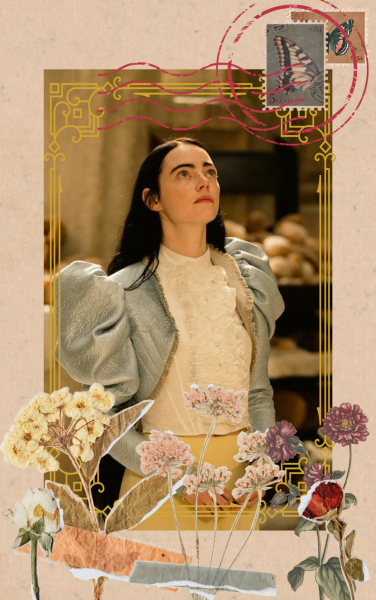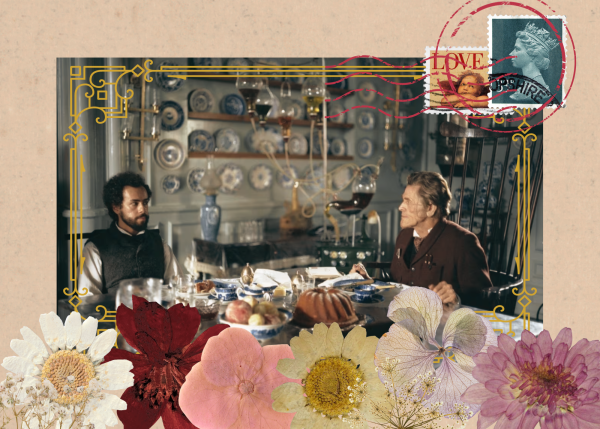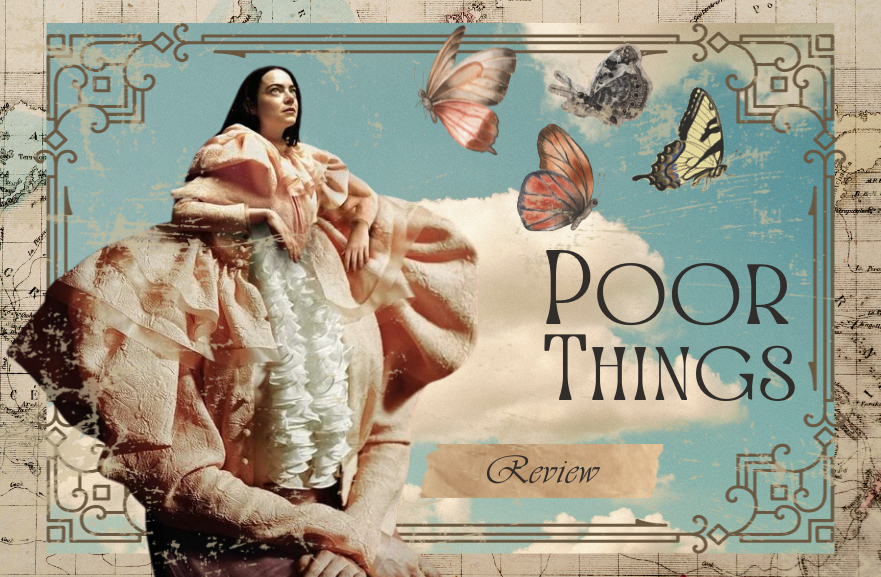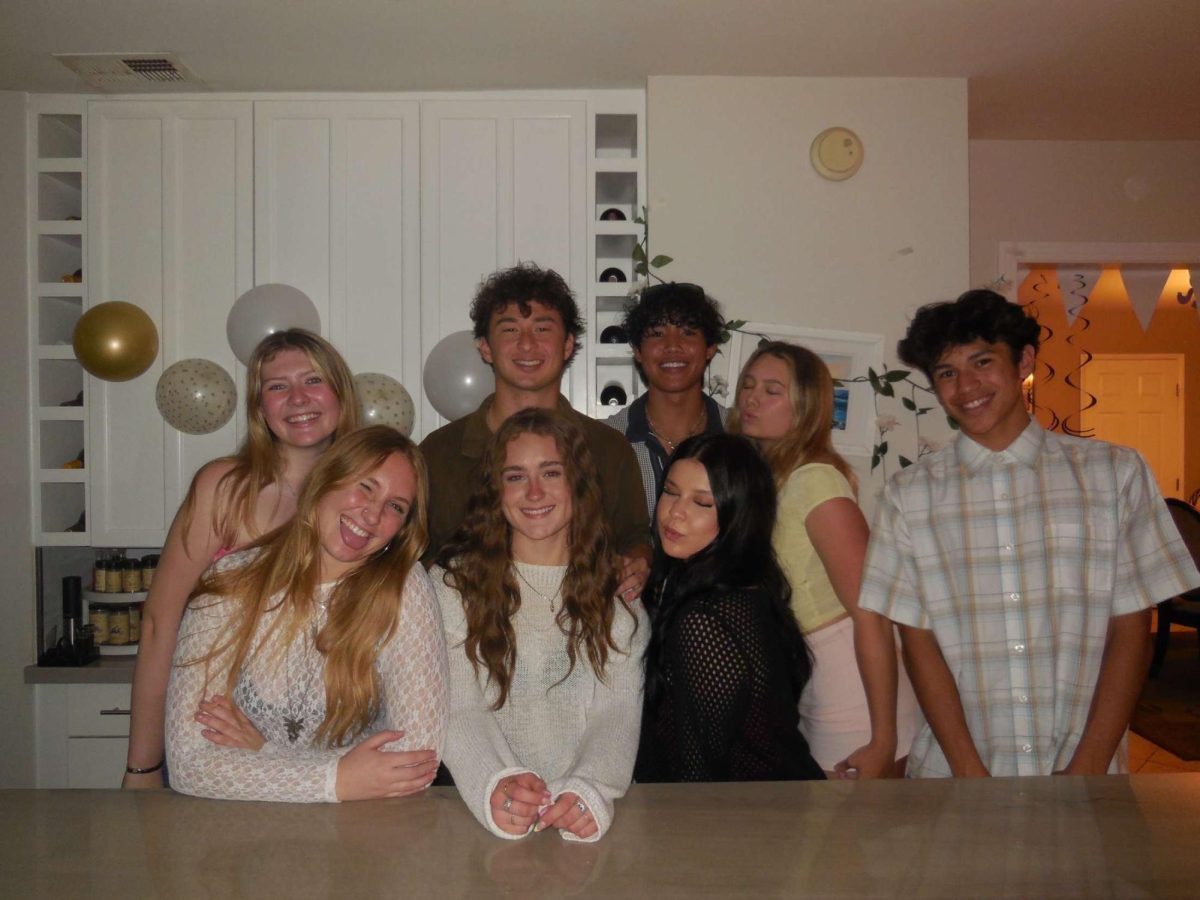Some movies just deserve the adjective “strange,” and “Poor Things” is one of them. It really is oh-so-odd and oh-so bizarre.
Gently inspired by Mary Shelley’s “Frankenstein,” and adapted from the 1992 novel of the same name by Alasdair Gray, “Poor Things” follows a young woman known as Bella Baxter (Emma Stone). If Bella is Frankenstein’s creature, her surrogate father and creator Godwin Baxter (Willem Dafoe) is Victor himself. Godwin’s name often gets shortened to “God,” which lends itself to many funny moments throughout the movie—“Did God send you?”. The Baxter household is also graced by the presence of a scientist and friend by the name of Max McCandless, played by Ramy Youssef.
Bella is an inquisitive soul whose evolution throughout the film is astounding. In the beginning, she is still learning how to walk and talk, but by the end, her movements are smooth and her speech is clear and clever. Bella’s discovery of the world around her is very sweet; both realistic and funny. Stone expertly creates a very endearing character, and the audience consistently roots for Bella. Even when she is a bit dim, the movie never frames her as an idiot, but rather as a child learning about the world around her.

Bella’s discoveries are echoed through the cinematography of the movie. The first twenty-five minutes are shot in black and white and stay inside the house. As Bella begins to learn more about the world, color explodes on screen, and the locations become more and more ludicrous as she embarks on her adventure.
“Poor Things” is not without its risqué moments, however, much of the movie is surprisingly explicit, following the encounters Bella has with multiple men throughout the movie. These aspects do not determine whether or not the movie is bad but could be too much for some people, especially if they’re not expecting it.
Bella gets tangled up in the affairs of one Mr. Duncan Wedderburn (Mark Ruffalo), who leads Bella into a world of sin and excitement until it all becomes too much. Ruffalo plays a strange Wedderburn, and it is never entirely clear what his motivations are. He makes the audience automatically wary of him upon his arrival at the Baxter house and continues to be a shady, untrustworthy presence throughout the movie. Wedderburn’s presence is unsettling at worst, and has a pathetic undertone at best, which makes way for both hideously dark and delightfully silly scenes.
Where “Poor Things” falls flat isn’t in the complex costumes, wacky set design, or disturbing close-up shots, but in the writing. The writing is fine, but it’s carried more by concept rather than content. Stone’s acting makes Bella’s journey meaningful, but the story doesn’t deliver as interesting a plot as the trailers promise. Despite this shortcoming, “Poor Things” still manages to be quite funny, in a pretentious Wildean way that could easily fall flat if the audience didn’t have a vague understanding of 19th and 20th-century literature. That being said, despite a few missed references here and there, “Poor Things” is still entertaining on a surface level.

By the time the two-hour and twenty-minute movie is over, the audience has fallen in love with the Baxters and Max, particularly with their relationships with one another. The father/daughter bond between Godwin and Bella is really special, and it’s a relief to find a father who wants the best for his child, even though it pains him. DaFoe, using a presumably Scottish accent, pleasantly surprises audiences by not falling into the typical “evil genius” stereotype and being a genuinely good person. Max and Bella also form a strong bond, and Youssef’s ability to believably fall in love with people meant to be monsters is as gorgeous as it is heartbreaking.
“Poor Things” is comforting in its portrayal of humanity, and Bella’s ignorance of it all is so horrible yet so captivating to watch. The audience walks away from the film looking at everything with a newfound sense of discovery, borrowing their curiosity from Bella herself. “Poor Things” recognizes how overwhelming it can be to be alive, but it also shows off the joys of life that are all around, as long as one knows where to look.









